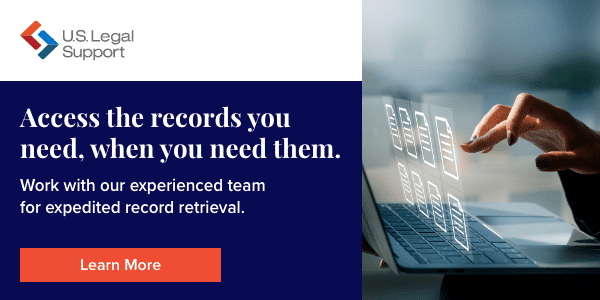Top Medical Record Retrieval Trends in 2024

While medical record retrieval may sound like a straightforward task, legal professionals know it’s a complex, time-consuming process involving multiple entities, layers of rules and regulations, and security concerns (which frequently shift as technology evolves). Those factors lead many firms to partner with outside experts who can monitor changing requirements and procedures while providing timely results.
As a leading provider of record retrieval services, U.S. Legal Support prioritizes staying informed on relevant technology advancements, security concerns, and clients’ needs. Each year, we publish results from a detailed litigation support survey—covering record retrieval and much more—completed by more than 1,000 legal professionals from single-market, regional, and AmLaw firms (and even some Fortune 1000 organizations).
Our 2024 survey responses reinforce the importance of litigation support partners who can obtain, organize, and consult on complex records while complying with security protocols and facilitating digital discovery processes. Read on for insights on firm choices, expectations, and trends related to record retrievals.
Medical Record Retrieval Usage and Vendor Reliance
Nearly half of the surveyed firms rely on outside vendors for record retrieval services and more than a third use vendors for many (or all) cases.
- 47.40% rely on external vendors for record retrieval
- 26.46% use vendors for most cases
- 13.7% used vendors for every case
These figures are very close to 2023’s survey responses. One trend that differed, however, was the number of vendors that firms rely on. The largest response group in both years (45.14% in 2024 and 48.01% in 2023) sticks with two to four selected vendors. However, at the top and bottom of vendor quantities, we see year-over-year changes in:
- Firms opting to work with a single vendor – 14.08% in 2024, up from 11.23% in 2023
- Firms using 11+ vendors – 4.09% in 2024, down from 5.68% in 2023
Record retrieval is a critical service that firms will continue handling through outside vendors due to the scale and complexity of their case needs. Many firms place emphasis on working with one quality vendor, which is great for reducing security risks, consolidating spend, and providing more insightful reporting.
Mitigating Security and Compliance Concerns in Medical Record Retrieval
When it comes to security and compliance, firms continue to rank these three things as the top priorities when selecting a vendor:
- Data privacy policy
- HIPAA compliance (verified by independent audits)
- End-to-end encryption of transmitted files
The prioritization of HIPAA compliance when selecting a litigation support vendor grew in importance year-over-year, from 48.67% in 2023 to 51.14% in 2024.
When you consider the possible penalties for lawyers handling medical records and compliance burdens extending to healthcare providers’ business associates, this concern makes sense. HIPAA violations can lead to both criminal felony and civil charges ranging from a lost license to a decade in federal jail and up to $250,000 in fines.1 As of September 30, 2024, the Office for Civil Rights (OCR) has collected $143.9 million from HIPAA sanctions.2
Medical Record Retrieval Partner Cybersecurity and Compliance Criteria
When evaluating potential partners’ security and compliance, be sure to look for the following in their service-level agreements and documentation:
- 24/7 network and security operations center
- Redundant data centers to promote full and uninterrupted availability of your data
- HIPAA compliance, including independent auditing
- End-to-end encryption of all transmitted files
- SOC 2 Type 2 compliance, including independent audit verification
- NIST Cybersecurity Framework compliance
Challenges and Opportunities in Medical Record Retrieval
Record retrieval can be time-consuming and frustrating, from identifying records’ locations to complying with each individual organization’s request procedures and following up with unreceived records. Managing this process isn’t always the best use of staff time for most firms.
Top barriers to in-house record retrieval include:
- The complexity of obtaining medical records and legal documents
- The need for rapid turnaround times
- Frequent changes in security and technology best practices
Outsourcing record retrieval to a skilled vendor allows firms to free up staff time and improves efficient, timely access to required documents.
How U.S. Legal Support Can Help
Medical record retrieval remains an essential litigation support service. Firms prioritize vendors who can provide security, cost control, and responsiveness. As the legal landscape continually evolves, firms look for integrated services and advanced security features.
U.S. Legal Support has served firms across the country for nearly 30 years, improving our efficiency and leveraging our collective expertise while simultaneously staying on top of shifting regulations, technology, and best practices. Our comprehensive and secure record retrieval services will meet your evolving needs, obtaining critical files within deadlines and delivering them through our secure Client Portal.
In addition to retrieval, we offer records organization, management, and analysis, including creating chronologies and expert summaries of key content.
U.S. Legal Support services also extend to court reporting, transcription, interpreting, litigation consulting, and trial services—from our TrialQuest division—including trial and jury research and consulting, mock trials, witness preparation, trial graphics and demonstratives, and trial presentation and technology services.
Contact us today by phone, email, or website request form to discuss how we can help with your record retrieval and other litigation support needs.
Sources:
- HIPAA Journal. What Happens if You Break HIPAA Rules? https://www.hipaajournal.com/what-happens-if-you-break-hipaa-rules/
- U.S. Department of Health and Human Services. Health Information Privacy / Enforcement Highlights. https://www.hhs.gov/hipaa/for-professionals/compliance-enforcement/data/enforcement-highlights/index.html

Editoral Policy
Content published on the U.S. Legal Support blog is reviewed by professionals in the legal and litigation support services field to help ensure accurate information. The information provided in this blog is for informational purposes only and should not be construed as legal advice for attorneys or clients.


